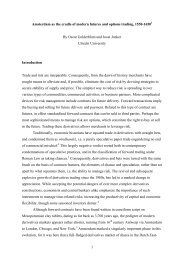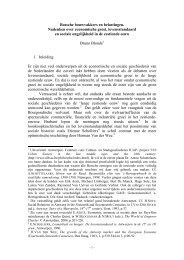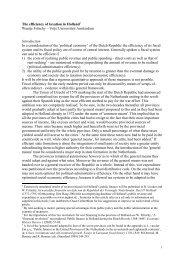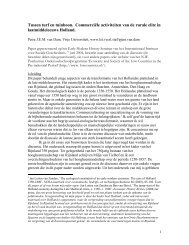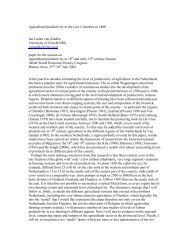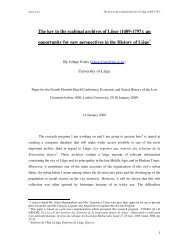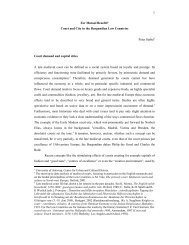Justyna Wubs-Mrozewicz LOOKING TWICE - Economy and Society ...
Justyna Wubs-Mrozewicz LOOKING TWICE - Economy and Society ...
Justyna Wubs-Mrozewicz LOOKING TWICE - Economy and Society ...
Create successful ePaper yourself
Turn your PDF publications into a flip-book with our unique Google optimized e-Paper software.
Looking twice, <strong>Justyna</strong> <strong>Wubs</strong>-<strong>Mrozewicz</strong> January 2009<br />
exchange his fish for grain <strong>and</strong> other products provided by the merchant. In other words, he<br />
was not free to buy desired products from, for instance, traders from Amsterdam.<br />
However, Holl<strong>and</strong>ers themselves took advantage of the limitations which the credit<br />
system imposed for Hansards, namely their restriction to Bergen. Holl<strong>and</strong>ers looked for other<br />
keys to success by pursuing their own stockfish trade <strong>and</strong> conducting business under more<br />
favourable trading conditions. This entailed venturing off the beaten track of Bergen <strong>and</strong> even<br />
Norway, while at the same time regularly throwing a spanner in the works of the Hansards.<br />
First of all, they focused on Icel<strong>and</strong>. Sailing from Amsterdam to Icel<strong>and</strong> is already recorded<br />
for 1439, 83 <strong>and</strong> unlike Hansards, after the 1490s they were no longer hindered by royal bans<br />
from trading there. It must be noted that from the beginning of the fifteenth century, Bergen<br />
ceased to be the sole destination of Icel<strong>and</strong>ic fish: it was now being shipped to Engl<strong>and</strong>, <strong>and</strong><br />
from the second half of the fifteenth century also to several German towns <strong>and</strong> Amsterdam. 84<br />
For the years 1514-1516 there are two sources in which Kontor merchants vociferously<br />
denounced, among other things, Holl<strong>and</strong>ish sailing to Icel<strong>and</strong>, just as they denounced similar<br />
practices by merchants from Bremen <strong>and</strong> Hamburg. 85 According to the Kontor traders, this<br />
malpractice had been going on for years, <strong>and</strong> had a pernicious influence on their own fish<br />
trade. If not stopped, it would cause the demise of the Kontor <strong>and</strong> the fish trade in Bergen—as<br />
Icel<strong>and</strong>ic fish was being shipped in great quantities to northern Germany <strong>and</strong> Amsterdam, the<br />
dem<strong>and</strong> for fish from Bergen was dwindling. 86 Fish from Icel<strong>and</strong> was cheaper, <strong>and</strong> therefore<br />
offered stiff competition to fish from Bergen. The difference in price probably sprang from<br />
the fact that there was no Kontor to monopolise prices. 87 Moreover, fish from Icel<strong>and</strong> was<br />
harder than fish from Norway due to different drying conditions, which made it of an inferior<br />
quality but most likely also reduced its price. 88 The quality problem was solved by customers<br />
in Westphalia <strong>and</strong> the Rhine area in the beginning of the sixteenth century, who devised a<br />
stockfish mill to batter the commodity <strong>and</strong> make it softer. As a result, the difference in quality<br />
83 DN 20 nr. 823.<br />
84 NGL II/1 nr. 377; NGL II/1 nr 385; DN 20 nr. 789; Schreiner, Hanseatene og Norge, p. 43; Baasch,<br />
Forschungen, pp. 6-16; B.E. Gelsinger, Icel<strong>and</strong>ic enterprise. Commerce <strong>and</strong> economy in the Middle Ages<br />
(Columbia S.C. 1981) p. 193; M. Simon Thomas, Onze IJsl<strong>and</strong>svaarders in de 17de en 18de eeuw: bijdrage tot<br />
de geschiedenis van de Nederl<strong>and</strong>sche h<strong>and</strong>el en visscherij (Amsterdam 1935) pp. 6-13.<br />
85 AHL, Bergenfahrer nr. 1348 c.1515/1516 <strong>and</strong> 1514, ‘Gebreke des copmans to Bergen in Norwegen<br />
vorkerende’ in Bruns, Bergenfahrer, pp. 211-214 <strong>and</strong> NGL II/4 nr. 17.<br />
86 ‘Gebreke’, in: Bruns, Bergenfahrer, pp. 212-213 <strong>and</strong> NGL II/4 nr. 17; AHL, Bergenfahrer nr. 1348<br />
c.1515/1516, where they stated that as a result of this trade, fish from Bergen was disregarded (‘de Bargerfisch<br />
nicht groth geacht is’); compare 1487, HR III/2 nr. 160 § 149.<br />
87 ‘Gebreke’, in: Bruns, Bergenfahrer, p. 213 <strong>and</strong> NGL II/4 nr. 17.<br />
88 Christian Keller (University of Oslo), personal remark; J. <strong>Wubs</strong>-<strong>Mrozewicz</strong>, ‘Fish, stock <strong>and</strong> barrel. Changes<br />
in the stockfish trade in northern Europe c. 1360-1560’. There was also a difference in the quality of fish from<br />
the tributary isl<strong>and</strong>s <strong>and</strong> Bergen, <strong>and</strong> therefore it was forbidden to mix the two; see NGL II/3 nr. 389 § 153<br />
(1494).<br />
12



